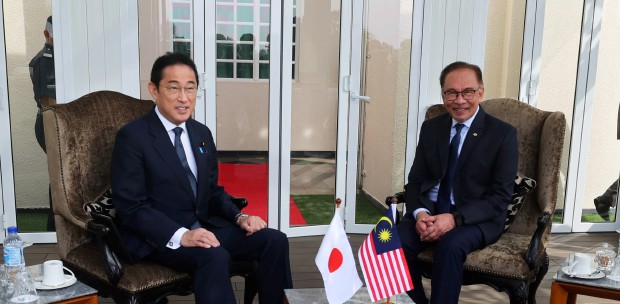FEBRUARY next year will mark the 40th anniversary of the Look East Policy. I want to take this opportunity to share my thoughts on the new partnership between Malaysia and Japan in the post-pandemic era.
The Look East Policy enabled young Malaysians to learn that science and engineering, technical skills, quality control, work ethics, and individual and organisational discipline have contributed to the miraculous socio-economic development in Japan.
With the Japanese government's support, the Malaysian government sent about 16,600 students and civil servants to study in Japan from 1982 to 2017.
They studied in Japanese language programmes, technical colleges, undergraduate and post-graduate degrees, as well as technical and management training programmes. More than 35,000 Malaysians have studied and graduated from Japan colleges and universities since 1982.
Did Malaysia benefit from the Look East Policy? Yes. Its national output, trade, and investments have grown leaps and bounds. Its nominal gross domestic product and GDP per capita expanded 23 times and 10 times, respectively, from 1982 to last year.
The growth is at an annual average rate of 8.2 per cent and 6.0 per cent, respectively. The annual average growth rate of total bilateral trade between 1981 and 2019 is around 10.5 per cent.
Exports to and imports from Japan grew at about 6.5 per cent and 5.5 per cent in the same period. Japanese inward investment balance in Malaysia in 1996 was US$5.75 billion, and it was US$18.65 billion last year — a growth of more than threefold in about 25 years.
Similarly, international travelers to and from Japan has risen. About 17,500 Malaysians visited Japan in 2006, and the figure rose to 26,100 in 2019. Japanese visitors to Malaysia in 2011 and 2018 were about 386,700 and 395,500, respectively.
Free movements of goods, capital, and people in the last two decades have advanced Japanese popular culture in Malaysia, too. Anime, such as Dragon Ball, Doraemon and Pokemon, have gained citizenship in Malaysia. Singers Gackt, Arashi, AKB48 and Utada Hikaru are also well known in Malaysia.
It is reasonable to say that the aforementioned aspects testify to the enhanced bilateral relations between Malaysia and Japan. This relationship not only is greater than economic transaction, but Japanese and Malay-sians have become true friends.
The Look East Policy has strengthened our absorptive capacity in development.
Many Malaysians have adapted manufacturing technology and business management know-how, which are being embedded in Japanese investments in Malaysia.
However, we must not become complacent because we still can learn a lot from Japan.
Despite the lack of natural resources, Japan has and will continue to transform its crucial human resources to the highest efficient and effective human capital in producing quality goods and services in the world.
Japanese society and human capital in particular are embedded with high ethics and morals.
Hence, our continuous learning will make the bond of our multiracial social fabric more resilient and harmonious.
On that basis, I must suggest that Malaysia and Japan have a closer working relationship for new partnership in raising our friendship to a higher plateau. Imported goods from Japan in 2019 were worth US$13.3 million.
Notably, goods classified as live animals and related products; vegetable products; animal or vegetable fats and oils; prepared foodstuffs, beverages and other substitutes; products of the chemical or allied industries; miscellaneous manufactured articles were valued US$420 million.
It is 3.2 per cent of the total imports. Most of them can apply for halal certification. The Malaysian halal certificate is the gold standard in the international marketplace.
In this context, therefore, the initial step for consolidating the new partnership must require the government, businesses, researchers, educators, representatives of not-for-profit organisations in both countries to make deeper cooperation in intensifying Japan's manufacturing capability in halal goods.
The proposed new partnership is mutually beneficial, too. Equally important, if not more, halal lifestyle is surely safer and healthier in the post-pandemic era.
Enhanced new partnership will provide enhanced and extended opportunity for Malaysian businesses in the venture of the globalising halal businesses, which will lead to greater benefits for everyone.
The global Muslim market will grow to more than US$3 trillion in 2024 and beyond. The proposed new partnership between Malaysia and Japan will broaden the frontier of Malaysia's gold standard in halal industry.
I urge the International Trade and Industry Ministry and Halal Development Corp Bhd to work closely in incentivising Japanese companies to invest in halal parks. This is essential for consolidating Malaysia and Japan Partnership 2.0.






